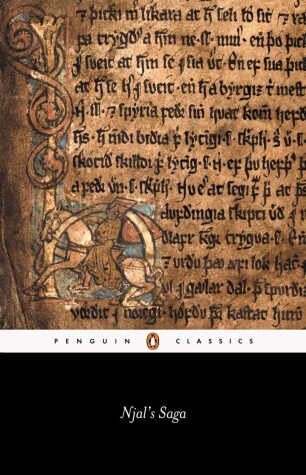
Written in the thirteenth century, Njal's Saga is a story that explores perennial human problems-from failed marriages to divided loyalties, from the law's inability to curb human passions to the terrible consequences when decent men and women are swept up in a tide of violence beyond their control. It is populated by memorable and complex characters like Gunnar of Hlidarendi, a powerful warrior with an aversion to killing, and the not-so-villainous Mord Valgardsson. Full of dreams, strange prophecies, violent power struggles, and fragile peace agreements, Njal's Saga tells the compelling story of a fifty-year blood feud that, despite its distance from us in time and place, is driven by passions familiar to us all.
This Penguin Classics edition includes an introduction, chronology, index of characters, plot summary, explanatory notes, maps, and suggestions for further reading.
For more than seventy years, Penguin has been the leading publisher of classic literature in the English-speaking world. With more than 1,700 titles, Penguin Classics represents a global bookshelf of the best works throughout history and across genres and disciplines. Readers trust the series to provide authoritative texts enhanced by introductions and notes by distinguished scholars and contemporary authors, as well as up-to-date translations by award-winning translators.
The storyline of Njal’s Saga can seem hopelessly complicated at first glance. The tales are based on historical events, so there are a number of people who play only minor roles, there are long lists of characters’ ancestries, and there are people who share the same name. However, just a little way into the book, the reader should be able to pick out and focus on the key characters with ease, and once he does, he will become wonderfully invested in their lives. The cast of Njal’s Saga is quite fantastic, ranging from old wise men to battle-eager youths and more than a few strong-willed women. Even though good characters die throughout the tale, there is always another hero who comes to forefront for readers to love. Anyone who likes a book that establishes great character relationships and includes lots of action will enjoy Njal’s Saga.
The action results from the tension that grows around the main themes— honor and masculinity. In this period of Iceland’s history, anyone who murdered another man was required to pay for his death with money. Theoretically, this practice should appease the family of the victim and prevent blood feuds from developing. In Njal’s Saga, however, the system only occasionally works. There subsequently develop questions over whether it is more honorable for a man to peacefully accept compensation and maintain old friendships or whether it would be more manly for him to enact a killing of his own in revenge. Both answers, at different times, appear to be correct. Other questions of masculinity are what the implications are if a man is beardless, whether a man must delight in killing, and whether it is acceptable for a man to cry.
More minor themes include the role of women in society, the arrival of Christianity in Iceland and its interaction with the old religion, and how the law can be cleverly interpreted for one’s own gain. This may sound like an outline for a history lesson, but it is quite refreshing to encounter demanding women who curse their lovers or call for revenge in a medieval text, and it is marvelously entertaining to watch what tricks the men will come up with next to skirt the law. I would and have enthusiastically recommended this to casual readers for fun, not just to students of the Middle Ages.
This review was also posted at Pages Unbound Book Reviews.
Reading updates
-
Started reading
-
9 December, 2011:
Finished reading
-
9 December, 2011:
Reviewed
